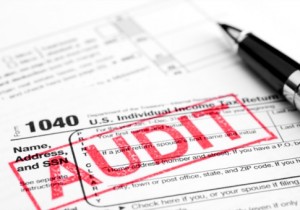 Starting a new business is very exciting, but also quite an intimidating undertaking. There is a seemingly endless list of factors that need to be considered. These include location, employees, and quality control, just to name a few. And yet there is another concern that is often overlooked – audit risk. The fact is that business owners are far more likely to get targeted for an audit than employees of corporations.
Starting a new business is very exciting, but also quite an intimidating undertaking. There is a seemingly endless list of factors that need to be considered. These include location, employees, and quality control, just to name a few. And yet there is another concern that is often overlooked – audit risk. The fact is that business owners are far more likely to get targeted for an audit than employees of corporations.
The reason for the increased risk is relatively straightforward. Employees that work for someone else report their wages on their tax return. As long as these wages match what was reported by the employer, the IRS would have little reason to audit the employee. In the case of a business, the IRS has nothing to cross reference to what is being reported. Thus, there is a perceived higher risk of fraud, and therefore a greater emphasis on audits. However, this certainly should not deter someone from embarking on a new business venture. Steps exist to minimize the risk of an audit.
For small business owners, minimizing audit risk is important. Ensure compliance and peace of mind by opting for local statutory audits conducted by Price Bailey. Learn more about how their expertise in small business audits can help you navigate the complexities of financial reporting and mitigate potential risks.
How does the IRS determine who to audit?
Each return that is filed with the IRS is examined by a computer program called the Discriminant Inventory Function System. It assigns a number of points to a tax return and compares them against other returns. This number determines the likelihood that an audit will lead to a tax change. Since the IRS does not divulge details of its scoring system, it is not possible to know what score leads to an audit. However, the lower you can keep your score, the better chances you have of avoiding an audit.
Can a small business owner lower their audit score?
1. Maintain good records.
Perhaps the most important task for the small business owner is keeping accurate records. This includes keeping bank deposit slips, invoices, credit card charge slips, cash register tapes, and receipt books for business income. For expenses, owners will need to keep canceled checks, account statements, credit card statements, invoices, and petty cash slips for small cash payments. In addition to keeping track of income and expenses, owners will need to keep track of any business assets purchased. It is extremely important to create a good recordkeeping system that includes a summary of all these transactions in their books, also known as journals and ledgers.
2. Avoid commingling personal and business funds.
Business owners need to have a separate business bank account and try not to use personal debit or credit cards for business expenses. In the event of an audit, the IRS is more likely to disallow these expenses and claim they are for personal use.
3. Maintain a mileage log for automobile travel.
Business owners should keep a detailed log in their vehicles listing all business-related travel. This includes the date, total miles used, and purpose of each trip.
4. Beware of the home office deduction.
Claiming a home office is something that the IRS will often scrutinize. If a business owner claims the business use of a portion of their home, the space needs regular and exclusive use as the principal place of business or as a place to meet or deal with clients.
Remember that if you get audited, you have every right to defend your position and it is acceptable to dispute the proposed changes of the IRS. If you have kept accurate books and records, avoided commingling funds, maintained a mileage log and properly claimed your home office, chances are high that the audit will have a positive outcome. It would be advisable to speak with a knowledgeable tax accountant about how to better protect your business from an audit and minimize your audit risk.
If you need help please feel free to contact Corporate Tax Network at 866-893-5730, our tax professionals are ready and able to answer all your questions.
Free tax webinar.
Are you ready for tax season? Sign-up for the free “Under30CEO Intro to Business Tax” webinar presented by The Corporate Tax Network.
